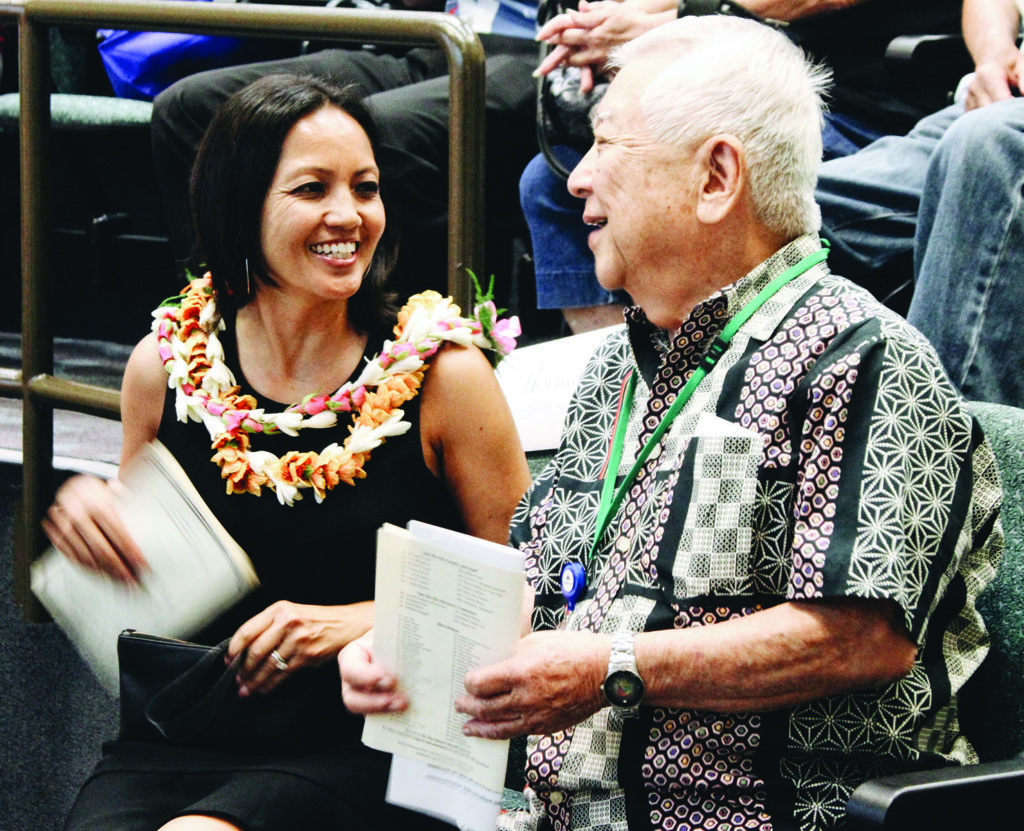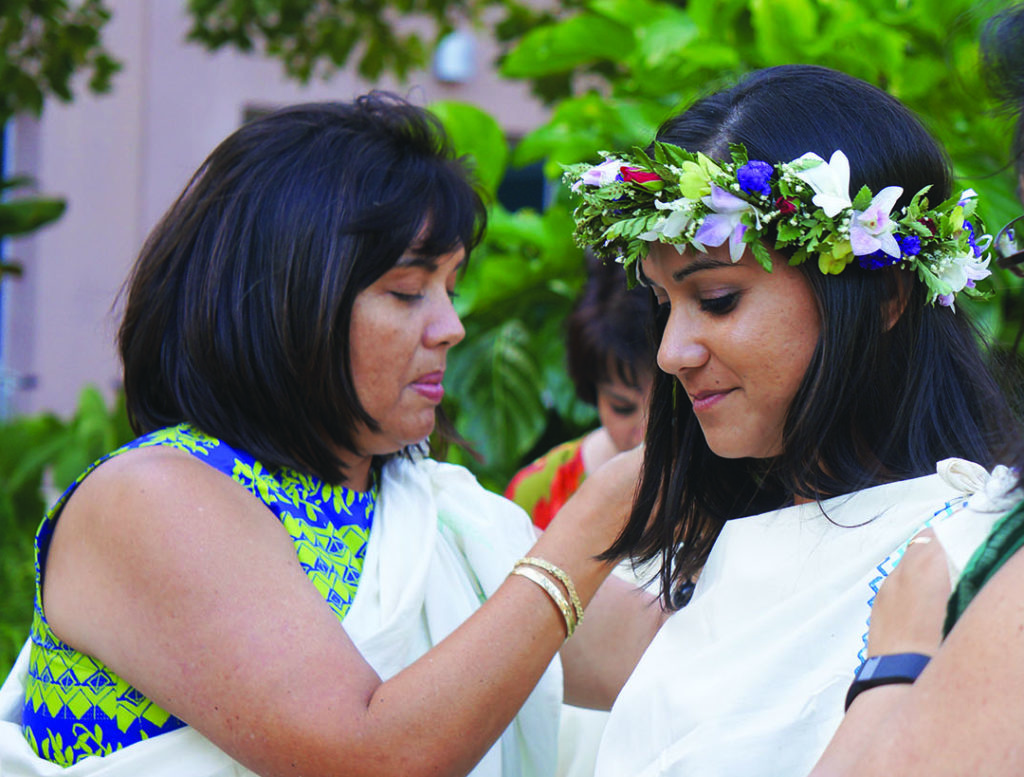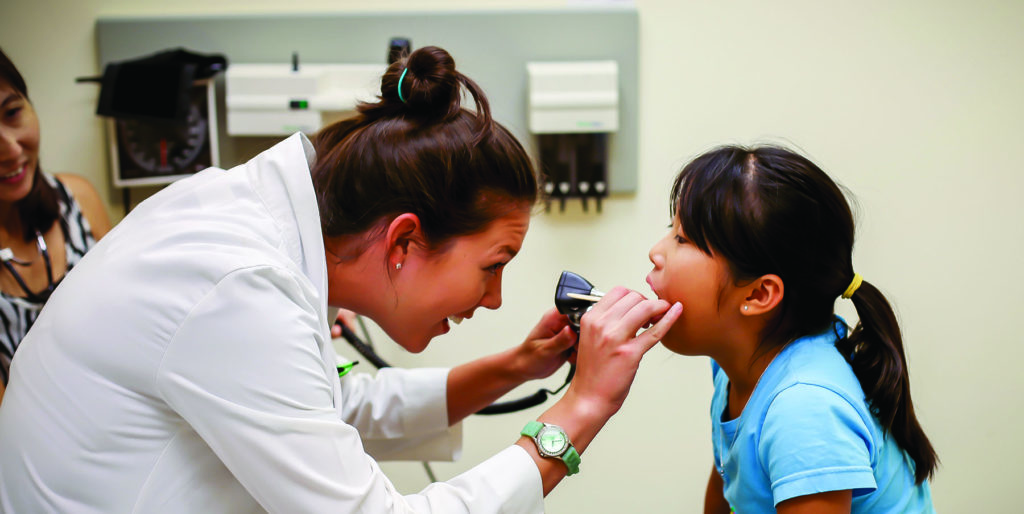Creating Pathways for Future Native Hawaiian Physicians
Despite Hawai‘i being ranked as one of the healthiest states in the nation, significant disparities exist for Native Hawaiians who struggle with poor health outcomes related to diabetes, cancer, obesity and other chronic health conditions. Native Hawaiians are also more likely to be homeless, incarcerated and uninsured while suffering from higher mortality rates and shorter lifespans when compared to the general population.
Native Hawaiians trace their origins to skilled Polynesian voyagers and scientists who navigated across the vast Pacific Ocean approximately 1,500 years ago to Hawai‘i using only the stars. Prior to Captain James Cook’s arrival in 1778, the native population was a robust 500,000 strong. However, isolation and lack of immunity left Native Hawaiians vulnerable to diseases such as measles and influenza—and by 1893, the population had decreased by 90 percent. The overthrow of the Hawaiian monarchy and subsequent annexation by the United States brought the Hawaiian people, culture and language to the verge of extinction. This history of cultural trauma and rapid social change is believed to be a significant contributor to the current health and socioeconomic disparities experienced by Native Hawaiians.

To address these disparities, the Native Hawaiian Center of Excellence (NHCOE) was established more than 25 years ago and remains a key diversity program of the John A. Burns School of Medicine (JABSOM) at the University of Hawai‘i at Mānoa (UH Mānoa). With the charge of improving the health of Native Hawaiians through education, research, and community partnerships, NHCOE is located in a unique clinical department dedicated to the health of an indigenous people—the Department of Native Hawaiian Health (DNHH).
In 2017, NHCOE secured a five-year, $3.5 million dollar renewal grant from the U.S. Department of Health and Human Services, Health Resources and Services Administration, Bureau of Health Professions. The funding is used to increase the number of Native Hawaiians in medicine and allows expansion of recruitment, educational opportunities, and retention initiatives and exposure to health careers and physician role models for K-12 and college-level students. Additionally, NHCOE remains the lead unit for cultural competency training of all JABSOM medical students and faculty development initiatives under DNHH.
“Native Hawaiians are highly underrepresented in the health professions, particularly in medicine,” says Dr. Winona Mesiona Lee, principal investigator of NHCOE. “We must grow our own healers by improving recruitment and retention of local students who are committed to serving their home communities.”
Currently, Native Hawaiian and Other Pacific Islanders (NHOPI) comprise approximately 25 percent of Hawai‘i’s population, but make up only 3.7 percent of the state’s total physician workforce. With pioneering efforts of former NHCOE directors, Drs. Benjamin Young and Nanette Judd, as well as critical partnerships that include ‘Ahahui O Nā Kauka—Association of Native Hawaiian Physicians, Kīpuka-Native Hawaiian Student Center at the University of Hawai‘i Hilo, Office of Student Equity, Excellence, and Diversity at the UH Mānoa, Nā Pua No‘eau—Center for Gifted and Talented Native Hawaiian Children, Papa Ola Lokahi—Native Hawaiian Serving Organization and Scholarship Program, and the Myron B. Thompson School of Social Work at the UH Mānoa, NHCOE has created sustainable pipeline programs for Native Hawaiian students who demonstrate a desire to become physicians.
The NHCOE Native Hawaiian Student Pathway to Medicine (NHSPM) program has mentored over 100 students and 60 percent of those who have applied have been accepted to JABSOM and other medical schools across the nation. Students receive guidance on preparing medical school applications, mock interview practice and financial assistance to support preparation for the Medical College Admission Test (MCAT). While in the program, NHSPM students develop a supportive network with other pre-med students during a traditionally competitive and often overwhelming experience for most students. While participating in NHCOE’s Native Hawaiian Interdisciplinary Health program, students team up with Native Hawaiian social work students to deepen their understanding of cultural empowerment within an interprofessional setting and learn how culture influences patients’ perspectives on health and disease.
NHCOE has extended its reach annually to over 2,500 students spanning the K-12, undergraduate and post-baccalaureate populations with faculty and staff visits to rural areas of O‘ahu and the neighbor islands to meet with prospective students who have displayed potential, but have lacked the necessary opportunities and resources. One such example is the successful Nānākuli Pathways to Health program now in its fourth year. Under the program, JABSOM students (supervised by NHCOE faculty) provide health presentations and mentor 7-12th graders who are interested in science and/or health careers. This innovative and collaborative partnership between NHCOE, Nānākuli High and Intermediate School, Kamehameha Schools, and the James and Abigail Campbell Family Foundation helps to further strengthen NHCOE’s efforts to inspire students to pursue higher education and health careers.

Additionally, NHCOE has also established a research training pipeline focused on native health disparities for six undergraduate Native Hawaiian students, 28 JABSOM medical students and four Native Hawaiian research fellows. Faculty from NHCOE have published numerous peer review articles and the center has co-sponsored three national conferences including the National Association of Medical Minority Educators. Through the Summer Research Internship program at the DNHH, undergraduate students receive a stipend from NHCOE during a 7-week experience that pairs students with a research mentor and provides them first-hand experiences in health disparities research. “The continuing success of our Native Hawaiian Center of Excellence and other related programs are vital to empowering our underrepresented groups to pursue careers in medicine. The NHCOE also serves as a vehicle to motivate these individuals to return to their communities as a physician to address the existing health disparities,” said Jerris Hedges, dean of JABSOM. “Given personal and family ties to rural and neighbor island communities, these physicians are helping us tackle the existing physician shortage in those communities where physicians are most critically needed.”

